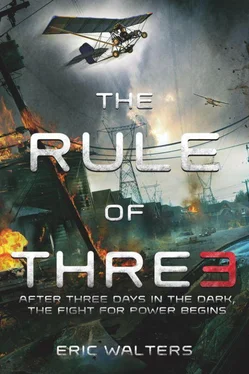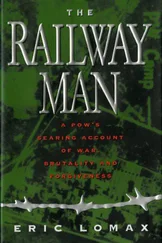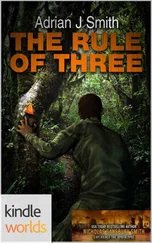“And then?”
“Then we’d have to find another way to get rid of our waste. And if the system is broken here, then it would be broken all over, including upstream from us. It would be almost certain then that the water from upstream would contain contaminants such as E. coli and other troublemakers.”
“How about as a precaution, I do a regular testing of the water from the stream?” Dr. Morgan asked.
“Excellent suggestion, Doc, but we have to take steps to act on those precautions,” Herb said. “If we wait until it happens, it will be too late. We need to start planning for waste disposal, and right now we need to start digging wells.”
“Wells? Is that possible?” Ernie asked.
“Completely,” Mr. Nicholas said. “The water table here is only a few feet below the surface. We wouldn’t have to dig any more than ten feet if we choose the right location. I can put somebody to work on that tomorrow.”
Herb smiled. “That’s the sort of response I like to hear. People are often good at finding excuses for why they can’t do something.”
“I’m an engineer,” Mr. Nicholas said. “My job is finding a way to make it work.”
“Any more coffee?” Judge Roberts asked.
“Yes, sir.” I topped up his cup.
“Thanks, son. That is certainly better coffee than we got at supper.”
“Sorry, but it’s hard to make coffee for a thousand people,” Ernie said.
“No need to apologize. The meal itself was excellent!” the judge said.
“Lots of people to help there, and we will get better as we go along,” Ernie said.
According to the plan, right now families were responsible for their own breakfast and lunch, either using up food they had in their homes already or relying on neighbors to share with them, and there was dinner for everybody, served at the gym, in shifts. We’d been lucky. Not only had we gone shopping just before this happened but Herb kept bringing over extra supplies. How much did he have in his basement?
“You have to know that we can all survive on far less food than the amount people usually eat,” Herb said.
“Is the plan for us to have to survive on less food?” the councilwoman asked. “Are you saying we’re going to have shortages?” She sounded panicky.
“We have food for now,” Herb said. “Correct, Ernie?”
“Dried beans, rice, canned goods, other staples. For a couple of months at least.”
“But we won’t be able to harvest most crops until at least four months from now,” Mr. Peterson said.
“We’ll be supplementing our existing stock by scavenging and gathering from the surrounding areas,” Herb said. “Things certainly went well today, right, Jeff?”
“Yes, it was a good day for scavenging,” Mr. Gomez said. Along with a group of others, escorted by armed guards, he was making daily rounds outside the neighborhood looking for food and other things that were needed.
I knew what Herb was doing, redirecting them away from the question of food shortages and bringing in positive news. Nobody else seemed to notice, but I did. Food was going to be an issue, just like he’d talked to me about in the beginning.
“In one day, the scavenging team procured enough dog food to keep all the neighborhood canines fed for the next few months,” Mr. Gomez continued, “as well as bags of soil, fertilizer, assorted tools and, interestingly, some crossbows and bolts, and some bows and arrows.”
“That is very successful,” Herb said.
“Maybe tomorrow we can locate more human food,” Mr. Gomez said.
“Although I know you wouldn’t turn your back on any food supplies you can find, I think we have some other items on the list.”
“What do you think we need first?” Mr. Gomez asked.
“Water will fall from the sky and food will spring from our soil. We need to prioritize about things that we can’t replicate. We need to get sufficient fuel supplies to run our vehicles and generators.”
“I thought the fuel truck that we dragged into the neighborhood would provide enough to last us,” Ernie said.
“It never hurts to have more than we need,” Herb said. “If nothing else we can always trade extra fuel to get additional supplies like food.”
“So what do you have in mind?” my mother asked.
“I want to take all of the fuel out of the underground tanks at the gas station.”
“Couldn’t we just expand our perimeter defense to enclose the gas station?” my mother asked.
“Even if we could build fences it’s never advisable to concentrate such a valuable resource and store it near the perimeter of your defenses. Not only does that make it more vulnerable, but it actually encourages somebody to mount an attack.”
“But where would you store it?” Judge Roberts asked.
“That’s the beauty of it,” Herb said. “We transfer it to the gas tanks of cars throughout the neighborhood. Maybe those vehicles can’t be driven, but they can store fuel.”
“That makes perfect sense,” my mother said.
“And we can also get more fuel and more storage by going out and getting vehicles that have stalled on the roads just outside the neighborhood,” Herb added.
“Also,” Mr. Nicholas said, “we’d be gathering tires that can be burned for heat, and metals and parts that can be stored for other use. It’s amazing what the components on a car can be converted to.”
“It sounds like you have some ideas. Would you like to share them?” my mother asked.
“I started thinking about the use of car parts, including alternators and generators, to construct small windmills to generate power,” Mr. Nicholas said.
“You can do that?” Judge Roberts asked.
“We can. Renewable energy would free us of the long-term need for gas to fuel the generators,” he explained.
I had the feeling that Mr. Nicholas probably had a better understanding than most of what “long-term” might actually mean.
“Excellent,” Herb said. “Please start whatever is necessary to begin experimenting in that area.”
“I’ll be really happy when all those cars are removed from outside the walls,” Howie said. “Right now they’re nothing more than places that outsiders could use for cover in a gunfight or to set on fire. So our defense would be more solid once those are removed.”
“It’s a win-win-win situation,” my mother added.
“And how would you move these cars?” the judge asked.
“We break a window, jam the ignition on, and then either push them or tow them in.”
“I’m still hesitant to take possession of other people’s property,” the judge said.
“What if we list each vehicle by plate, vehicle identification number, and the person listed on the ownership papers, if the papers are in the car? Does that seem sufficient?” Herb asked.
“Works for me,” the judge said.
It had been agreed that as a founding principle we would try to respect the rights of others, including those outside our community. Items taken were to be listed, and any other act on behalf of the neighborhood that could be interpreted as criminal had to be brought back before the committee for review and approval by the committee members.
“Mr. Gomez, can you take charge of gathering those vehicles?” my mother said.
“Of course, first thing tomorrow. I’ll get another team together for that task. We have lots of people willing to help with almost anything.”
“I can offer security,” Howie said. “We can simply extend our guards to the other sides of those streets while that team is working on retrieving the cars.”
“And I can free up people to help get the cars,” Mr. Nicholas added.
“I appreciate that sort of enthusiasm from all of you,” Herb said, and others nodded in agreement.
Читать дальше












